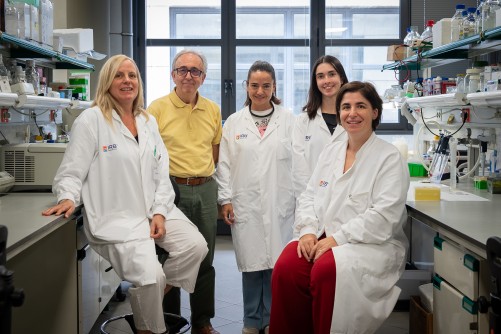A team of researchers at the Institute for Research in Biomedicine (IRB Barcelona) has identified a novel approach to addressing obesity that does not rely on reducing food intake. This groundbreaking study, co-led by Dr. Antonio Zorzano and Dr. Manuela Sánchez-Feutrie, was published in the journal Nature Communications on September 4, 2025. Their findings highlight the significant role of a protein called Neuritin 1, which is produced in brown adipose tissue and enhances energy expenditure.
The research shows that by increasing levels of Neuritin 1 specifically in brown fat, the animals in the study burned more energy, which helped prevent fat accumulation. This mechanism differs from existing anti-obesity drugs, like Ozempic and tirzepatide, that primarily work by suppressing appetite. “By increasing the levels of Neuritin 1, we observed that the animals burned more energy, which helped prevent fat accumulation,” stated Dr. Zorzano, who also holds a professorship at the University of Barcelona and is a researcher at CIBERDEM.
Neuritin 1: A Key Player in Energy Metabolism
Previously studied for its influence on neuronal plasticity, Neuritin 1 has now been linked to metabolic functions in brown fat, which is specialized in generating heat through a process known as thermogenesis. This process is crucial for maintaining body temperature, especially in cold conditions. The researchers employed a viral vector to specifically drive the overexpression of Neuritin 1 in thermogenic fat cells, resulting in a sustained increase in metabolic activity without affecting food consumption or physical activity in the animals.
“This discovery positions Neuritin 1 as a promising therapeutic candidate for treating obesity and related conditions, such as type 2 diabetes and fatty liver disease,” emphasized Dr. Sánchez-Feutrie. The metabolic boost observed in the study led to notable improvements in various health indicators, including reduced weight gain, enhanced insulin sensitivity, and decreased liver inflammation, even among animals subjected to high-calorie diets.
Implications for Human Health
Beyond the animal model findings, genetic data in humans indicates a correlation between Neuritin 1 levels and susceptibility to obesity, suggesting that these discoveries could have significant implications for human health. The research team is now exploring avenues to translate these findings into potential therapeutic strategies for humans.
The study benefited from contributions by several core facilities at IRB Barcelona, including Bioinformatics and Biostatistics, Functional Genomics, Protein Expression, and Histopathology. Collaborators from international institutions, such as CNRS in France, Karolinska Institutet in Sweden, and the University of Houston in the United States, also played vital roles in this research.
While the findings are promising, it is important to note that this research is still in its early stages. Additional studies will be necessary before considering any potential therapeutic applications in humans. The full study is available in Nature Communications under the title “Identification of Neuritin 1 as a local metabolic regulator of brown adipose tissue.”






































































